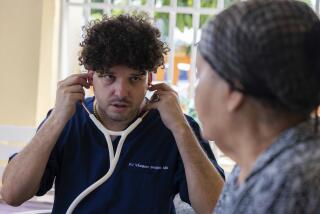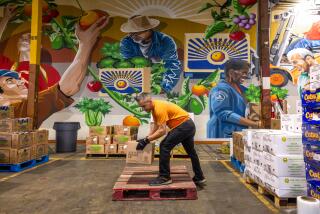Earthquake relief: A Good Samaritan faces ordeal in bringing food to orphans in Haiti
- Share via
Watching helplessly as a desperate crowd gathered around his truck in Haiti earlier this month, Fernando Pullum began to fear he had made a terrible mistake.
The Los Angeles musician and educator had gone there to take food to orphans left homeless by the devastating earthquake. But all he saw were menacing-looking men.
“They looked like the Sopranos,” Pullum said. “I’m thinking maybe we got shown some bogus pictures of orphans and we just got suckered into driving all this way to bring food to these adults.”
When Pullum saw the destruction on TV, donating a few dollars to a charity hardly seemed enough.
Wini Jackson, an old friend and child advocate, told him about an orphanage in the coastal town of Petit Goave, one of scores damaged in the Jan. 12 quake and its aftershocks, according to aid workers. The 45 children were sleeping in makeshift tents, never certain where their next meal would come from.
“Once we saw their faces and understood the need, that was it,” said Jackson, who learned about the orphanage on television.
Pullum organized an April 30 benefit concert featuring his students at the Fernando Pullum Performing Arts High School a new charter in South L.A. They raised $9,000, he said.
Although she was advised to give the money to an aid organization already in Haiti, Jackson said she wanted to be sure every penny reached the orphans.
Ludger Hyacinthe, the amateur cameraman who had filmed the orphanage, agreed to meet them in Petit Goave. On May 2, Pullum and Jackson flew to the Dominican Republic with a Spanish translator and a photographer, both volunteers.
They spent the first morning in Santo Domingo at the port and at a pharmacy, buying medicine, rice, flour, beans, cooking oil, milk powder, soap, detergent and toilet paper. Pullum insisted they leave for Haiti, on the other side of the island of Hispaniola, the same day.
He squeezed into the truck with the driver and the photographer. Traffic moved at a crawl, and they got two flat tires. It was midnight when they reached the border, too late to cross. So they checked into a rundown hotel.
At the border the next morning, a Haitian official inspected their load.
“I think she is going to be compassionate,” Pullum said. Instead, she pointed at the milk powder and said she wanted a box. Another official also helped himself.
Pullum was charged a fee for the truck and a fee for taking a Dominican driver into Haiti. But the officials told him that, as a favor, they would impose tax on only the milk powder. They took nearly $400.
When another man started rummaging through the food, Pullum recalls yelling: “You got all you’re going to get. So get off the truck!”
To his surprise, the man backed off, and they were allowed to pass.
“That’s when I discover the driver has no clue where he is going,” Pullum said. “He has never been to Haiti.”
They tried asking for directions, but none of them spoke the local Creole. Then Pullum remembered the GPS on his iPhone.
The road was full of craters and debris. The bridge into town had collapsed, so they drove through a stream. When the driver saw tents on the other side, he told Pullum to leave the food there and refused to move.
Pullum left the truck and went on alone. He found a man who knew the orphanage, but when he reached the place, all he saw was a damaged facade.
A woman appeared who seemed to be expecting him. She returned with him to the truck, which was now surrounded by people. Men started carting bags into a crumbling building with bars on the windows.
Pullum was about to despair when Hyacinthe turned up and screamed at the crowd. Immediately, the mood changed. Apologies were made. Food and beer appeared.
Pullum learned that the building was a hotel. Because the orphans were sleeping in a field, the woman caring for them wanted the donated food to be stored there. After dinner, she took Pullum and the photographer to see rows of tents full of children, hidden behind the damaged facade.
“When we walked in, they started singing,” Pullum said, choking back tears. Knowing they had food made it all worth it, he said.
Still, he called the trip “a draining experience.”
“It was disheartening too,” Pullum said, “because the people with uniforms are taking advantage of all these people who are suffering.”
More to Read
Sign up for Essential California
The most important California stories and recommendations in your inbox every morning.
You may occasionally receive promotional content from the Los Angeles Times.













